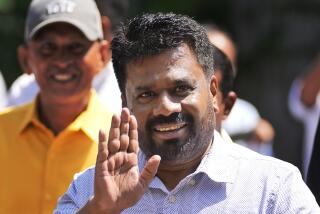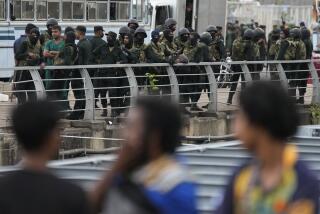Hard-Liners Lead Ballot in Sri Lanka
NEW DELHI â Sri Lankan hard-liners opposed to sweeping concessions to Tamil rebels appeared to have gained the upper hand in national elections, according to preliminary results released Saturday.
President Chandrika Kumaratunga called early elections in hopes of breaking a political stalemate over negotiations with the guerrillas. But the close results could end up prolonging the standoff, or destroying the peace process altogether.
With about two-thirds of the ballots counted Saturday night, neither incumbent Prime Minister Ranil Wickremesinghe nor Kumaratungaâs United Peopleâs Freedom Alliance were headed for an outright majority in the 225-seat Parliament.
The presidentâs alliance had received just over 47% of the vote, while the prime ministerâs United National Party had more than 37%.
The preliminary figures indicate that supporters of Kumaratunga, who opposed the prime ministerâs concessions to the rebels, will likely form the next government, analyst Paikiasothy Saravanamuttu said in a telephone interview.
Kumaratungaâs alliance seems poised to receive 104 to 106 seats and could form a coalition government with smaller parties, said Saravanamuttu, executive director of the Center for Policy Alternatives, a leading Sri Lankan think tank.
The presidentâs alliance said it would try to form a government.
The election commissioner said no more results would be released until today, after a meeting with all party leaders. There were allegations of fraud in at least two districts.
The fate of peace talks, which are currently suspended, is further complicated by a deep split in the ranks of the rebel Liberation Tigers of Tamil Eelam. The Tigers are demanding a homeland for the minority Tamils within a decentralized Sri Lanka.
The Tigersâ eastern commander, Vinayagamoorthy Muralitharan, better known to Sri Lankans as Col. Karuna, recently turned against guerrilla leader Velupillai Prabhakaran, who has a reputation for ruthlessly crushing dissent.
Karuna, considered one of the Tigersâ best military strategists, said before Fridayâs election that he wanted to sign a separate peace deal with the government. He also said Prabhakaran could not win a war without him because the east supplied most of the Tigersâ guerrillas.
The Tigersâ infighting and the likelihood that a new government would favor a hard line in peace talks raise doubts about the prospects for a negotiated settlement to what has been one of the worldâs most vicious civil wars.
âA lot of things have to be clarified, I would imagine, before one can really sit down and talk seriously about particular arrangements and structures,â analyst Saravanamuttu said.
Parliament is required to reconvene April 22.
Wickremesingheâs government signed a cease-fire with Tamil rebels in February 2002 and embarked on peace talks aimed at ending a civil war that began in 1983.
The Tigers had long fought for an independent homeland in the north and east of Sri Lanka. But after negotiations began, the rebels announced in September 2002 that they would settle for significant autonomy within a federal state.
Many among the Sinhalese majority oppose what they see as the first step toward a permanent division of the country. The Tigers fed that fear by insisting that they still had the right to fight for an independent state if necessary.
The results of Fridayâs election reflect âa general sense of insecurityâ among the majority of Sri Lankans when it comes to the peace process and the economy, Saravanamuttu said.
Kumaratungaâs alliance includes the Janatha Vimukthi Peramuna, or Peopleâs Liberation Front, whose mix of socialism and Sinhalese nationalism struck a chord among many disaffected voters.
The JVP once led a campaign of assassinations to block concessions to the Tamil minority in the 1970s and 1980s, but it then gave up militancy for more mainstream politics.
The partyâs promise of better times for millions of Sri Lankaâs poor apparently paid off in Fridayâs vote. But the strong showing could threaten efforts to negotiate a lasting peace with the Tamil Tiger guerrillas.
âIt seems like itâs a big vote of confidence in the Peopleâs Liberation Front,â Saravanamuttu said from Colombo, the capital. âAnd their attitude towards the peace process has been fairly hard-line.â
About 75% of the nearly 13 million registered voters cast ballots. More than 400,000 people registered to vote for the first time, according to the department of elections.
Candidates ran from 51 parties. A Tamil party that supports the Tiger rebels was running third.
More to Read
Sign up for Essential California
The most important California stories and recommendations in your inbox every morning.
You may occasionally receive promotional content from the Los Angeles Times.










